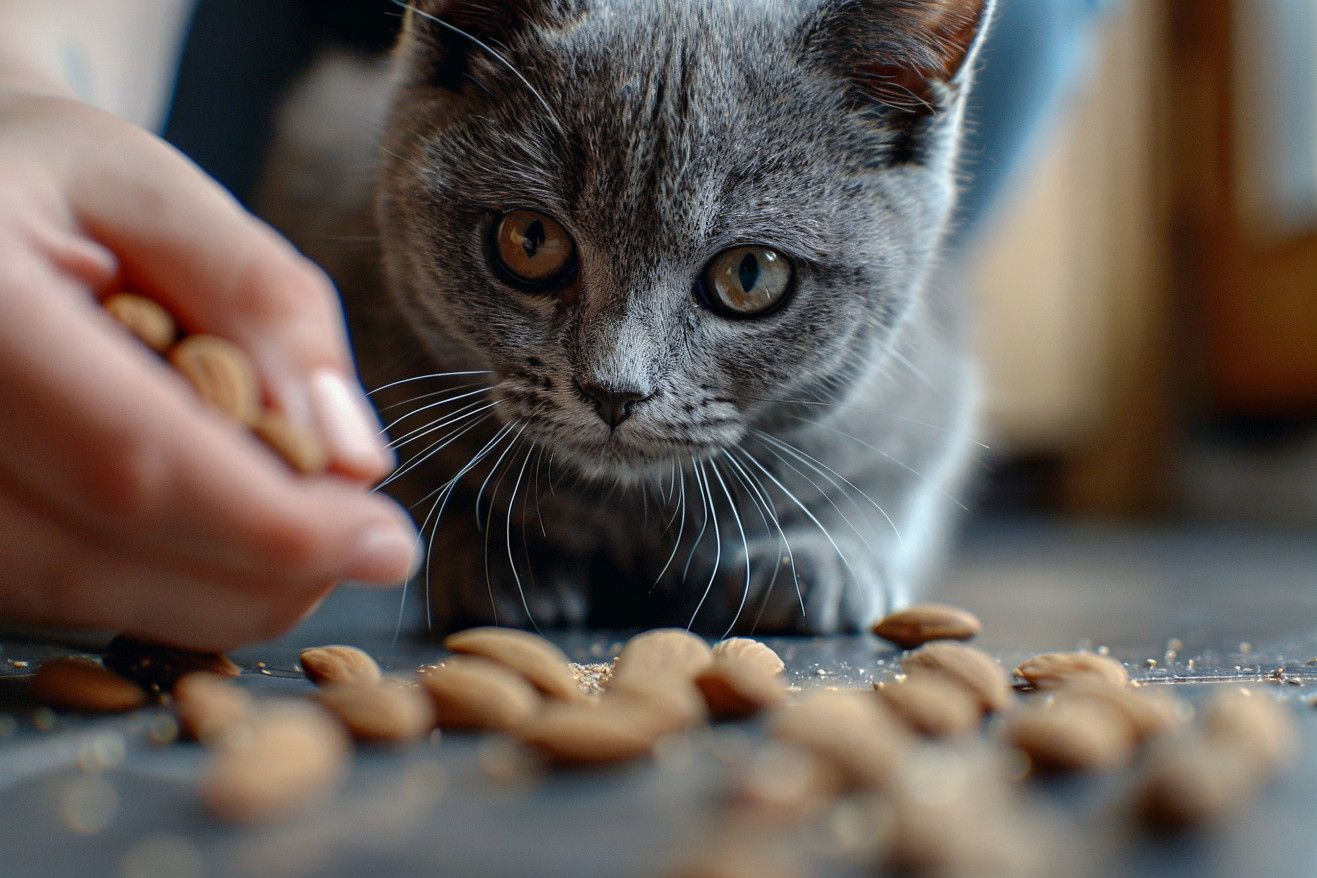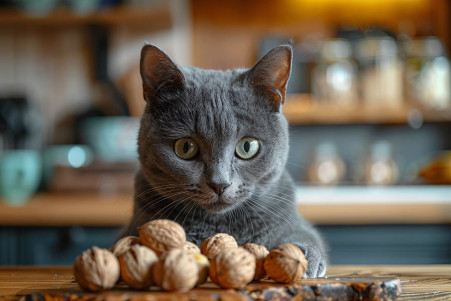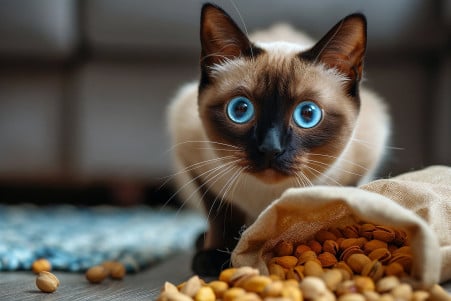Can Cats Eat Almonds? Understanding the Risks and Safe Practices
24 February 2024 • Updated 22 February 2024

Almonds have been shown to have a number of health benefits for humans, but it’s unclear whether the same holds true for cats. While sweet almonds are technically safe for cats to eat in small amounts, they are not recommended because they can pose health risks including choking and digestive issues.
On the other hand, bitter almonds are poisonous to cats and can be deadly. As a result, it’s important to talk to your vet before giving your cat almonds.
This article will explore the science of what cats need in their diet and the potential dangers of feeding cats almonds. By looking at information from veterinarians, nutrition research, and toxicology studies, we hope to provide a comprehensive look at how almonds can impact your cat’s health. Understanding this research will help you make better choices about what to feed your cat and how to keep them safe.
Can cats eat almonds?
Meeting a Cat’s Nutritional Needs as a Carnivore
Cats are obligate carnivores, which means they need nutrients that are only found in animal tissue to survive. According to VCA Animal Hospitals, these nutrients include amino acids such as taurine, fatty acids, minerals, and vitamins like vitamin A and niacin. Cats need to eat meat because plant proteins don’t have the amino acids that cats need in the right proportions, and cats’ digestive systems aren’t designed to process plant material very well.
To meet these needs, commercial cat foods are formulated to be similar to the diet of a cat’s natural prey, with high levels of protein, the right kinds of fats, and low levels of carbohydrates.
According to PetMD, the Association of American Feed Control Officials has created guidelines to make sure that cat food meets the nutritional requirements for different life stages of cats. This means that the diet of pet cats is designed to be similar to the diet of their wild ancestors.
On the other hand, non-meat foods like almonds don’t meet the nutritional needs of a cat’s carnivorous diet. Almonds don’t have the animal-based nutrients that cats need and don’t match the nutritional profile or the digestive abilities of a cat’s natural diet, according to research published in PMC.
As a result, while cats can eat small amounts of almonds, they won’t get the nutrients they need from them, so they aren’t a good choice for cats.
The Dangers of Feeding Almonds to Cats
While it may be tempting to give your cat a few almonds, it’s important for pet parents to know the dangers of feeding them to their feline friends. Sweet almonds, which are the type of almonds most commonly eaten in the United States, are not poisonous to cats.
That said, the ASPCA Animal Poison Control Center explains that almonds can cause gastrointestinal upset in cats, including vomiting, diarrhea, and abdominal discomfort. In more serious cases, cats that eat almonds can develop pancreatitis, which is a painful and potentially life-threatening inflammation of the pancreas.
The risks are even greater with bitter almonds, which contain cyanogenic glycosides. The Animal Emergency & Referral Center of Minnesota notes that the consumption of large amounts of bitter almonds can lead to cyanide toxicity in cats.
The symptoms of cyanide toxicity in cats, as outlined by Vetlexicon, include hyperpnea (abnormally fast breathing), convulsions, coma, and possibly cherry-red blood and mucous membranes. In these cases, cats need to be taken to the vet immediately because cyanide toxicity is fast-acting and often fatal.
Given these dangers, experts recommend that pet parents keep their cats away from almonds and instead give them treats that are safe and nutritionally appropriate for their dietary needs, which will help ensure their safety and well-being.
Healthy Snacks to Give Your Cat Instead
Even though cats can’t eat almonds, there are plenty of other healthy snacks that are more in line with their dietary requirements. According to PetMD, cats need a diet that’s high in animal protein, so small amounts of snacks like cooked lean chicken, turkey, or liver can be good for them. These meats contain the essential amino acids and other nutrients that cats need.
Some fruits, like melon and blueberries, may be good for some cats, offering hydration and antioxidants, according to Pawlicy Advisor. However, it’s important to introduce new snacks slowly and in moderation, making sure that no more than 10% of a cat’s daily calories come from treats. It’s also important to make sure that you’re feeding your cat the right portion size to avoid overfeeding and weight gain, as VCA Animal Hospitals points out.
When you’re introducing new snacks to your cat, make sure to do it slowly and in small amounts so you can watch for any negative reactions. Always make sure that any new snack is safe for cats and avoid feeding them foods that are toxic to them, like onions, garlic, or chocolate, as the ASPCA Animal Poison Control Center explains.
While a varied diet can be good for a cat, it’s important to make sure that it’s done in a way that’s healthy and meets their nutritional needs.
How to Tell If Your Cat Has Eaten Something Toxic
Symptoms of food toxicity in cats can range from mild to severe and depend on the specific toxic substance that the cat has ingested. According to PetMD, symptoms can include vomiting, diarrhea, depression, and in more severe cases, seizures or a coma. If you think your cat has ingested a toxic food, like almonds, which contain toxic substances described in a StatPearls article, it’s important to act quickly.
Remove the toxic food from your cat’s environment immediately and monitor your cat for any signs of illness. Call your veterinarian or an emergency animal hospital for advice. According to the Merck Veterinary Manual, early veterinary intervention is critical and can be life-saving because treatments can include decontamination, supportive care, and the administration of an antidote, such as hydroxocobalamin for cyanide poisoning.
To protect your cat, it’s important to take steps to prevent food toxicity. Keep potentially toxic foods in a secure location and learn about other common household items that can be toxic to cats. By doing so, you can help ensure that your cat is safe and that you can be a responsible pet owner with peace of mind.
Conclusion: Can Cats Eat Almonds?
In conclusion, while sweet almonds are not toxic to cats, they are not good for them and can cause health problems, including stomach issues and a choking hazard. Catster and the ASPCA have made it clear that there is a difference between sweet and bitter almonds, with bitter almonds containing hydrocyanic acid, which is poisonous to cats.
Cats.com also points out that cats are obligate carnivores and should eat a diet that is primarily made up of animal proteins, which means that sweet or bitter, almonds are not a good choice for cats to eat regularly.
As mentioned by Spot Pet Insurance, all veterinary professionals agree that you should talk to your vet before giving your cat any new food, especially one that is not part of their natural diet as a carnivore.
Being a responsible pet owner means that you understand and respect the dietary needs of cats and the dangers of feeding them human food like almonds. By making sure that your cat is eating a well-balanced diet that meets their needs and getting the advice of a vet, you can make sure that your cat stays healthy and happy.


